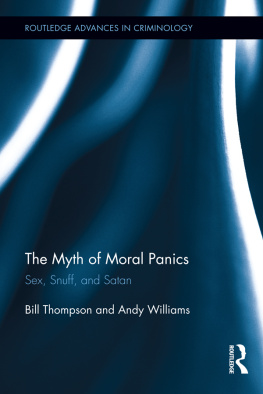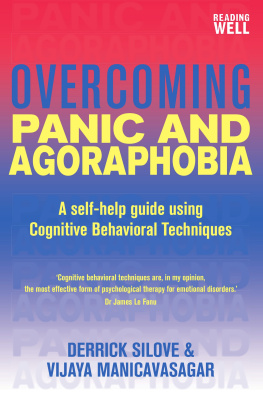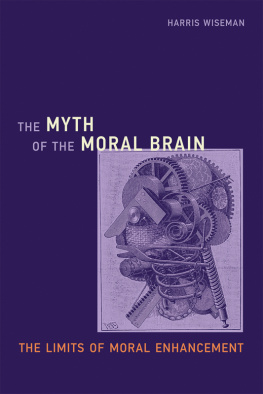The Myth of Moral Panics
This study provides a comprehensive critiqueforensic, historical, and theoreticalof the moral panic paradigm, using empirically grounded ethnographic research to argue that the panic paradigm suffers from fundamental flaws that make it a myth rather than a viable academic perspective.
Bill Thompson is a sociologist from the UK, where he was a Practicing Associate of the British Academy of Experts, and taught at Cambridge, Essex, and Reading Universities. In 2004, he relocated to the USA, where he has worked with the local Teamsters Union Chapter while teaching at SUNY and Hartwick Colleges.
Andy Williams is Principal Lecturer in Forensic Criminology at the Institute of Criminal Justice Studies at the University of Portsmouth.
Routledge Advances in Criminology
| Family Life and Youth Offending |
| Home is Where the Hurt is |
Raymond Arthur |
| Chinas Death Penalty |
| History, Law, and Contemporary Practices |
Hong Lu and Terance D. Miethe |
| The Politics of Antisocial Behaviour |
| Amoral Panics |
StuartWaiton |
| Hooked |
| Drug War Films in Britain, Canada, and the United States |
Susan C. Boyd |
| The Violence of Incarceration |
Edited by Phil Scraton and Jude McCulloch |
| Violence, Prejudice and Sexuality |
Stephen Tomsen |
| Biology and Criminology |
| The Biosocial Synthesis |
Anthony Walsh |
| Global Gambling |
| Cultural Perspectives on Gambling Organizations |
Edited by Sytze F. Kingma |
| Social Class and Crime |
| A Biosocial Approach |
Anthony Walsh |
| Security and Everyday Life |
Edited by Vida Bajc and Willem de Lint |
| Women and Heroin Addiction in Chinas Changing Society |
Huan Gao |
| Colonial Discourse and Gender in U.S. Criminal Courts |
| Cultural Defenses and Prosecutions |
Caroline Braunmhl |
| European Developments in Corporate Criminal Liability |
Edited by James Gobert and Ana-Maria Pascal |
| The Myth of Moral Panics |
| Sex, Snuff, and Satan |
Bill Thompson and Andy Williams |
The Myth of Moral Panics
Sex, Snuff, and Satan
Bill Thompson and Andy Williams

First published 2014
by Routledge
711 Third Avenue, New York, NY 10017
Simultaneously published in the UK
by Routledge
2 Park Square, Milton Park, Abingdon, Oxon OX14 4RN
Routledge is an imprint of the Taylor & Francis Group, an informa business
2014 Taylor & Francis
The right of Bill Thompson and Andy Williams to be identified as authors of this work has been asserted in accordance with sections 77 and 78 of the Copyright, Designs and Patents Act 1988.
All rights reserved. No part of this book may be reprinted or reproduced or utilised in any form or by any electronic, mechanical, or other means, now known or hereafter invented, including photocopying and recording, or in any information storage or retrieval system, without permission in writing from the publishers.
Trademark Notice: Product or corporate names may be trademarks or registered trademarks, and are used only for identification and explanation without intent to infringe.
Library of Congress Cataloging-in-Publication Data
Thompson, Bill.
The myth of moral panics : sex, snuff, and Satan /by Bill Thompson and Andy Williams.
pages cm. (Routledge advances in criminology ; 14)
Includes bibliographical references and index.
1. Moral panics. I. Williams, Andy. II. Title.
HM811.T467 2013
302'.17dc23
2013001400
ISBN13: 9780415812665 (hbk)
ISBN13: 9780203068663 (ebk)
To the memory of Tony Ham
Contents
The concept of moral panic is not only very popular; its proselytizers like to boast about its colonization of other disciplines and the number of hits on Google [Goode & Ben-Yehuda, 2010: 29 and 33]. Popularity, however, is no guide to validity, and Stan Cohens Folk Devils and Moral Panics [1973] is no exception. Its account of how horror-headlines turned an insignificant spat between a bunch of bored British teenagers into an irrational societal-wide reaction creating the deviancy that it condemned is a myth. Far from incite widespread alarm, the press was denounced as a lie factory by Britains leading moral entrepreneurs who rushed to the youths defense, and the horror-headlines were condemned by Parliamentarians who believed that the real trouble makers were the law and order lobby. Instead of panicking and demanding more social controls, the public lined up in an orderly fashion and voted to subsidize the teens coffee-bar culture at the next general election.
Rather than chart the history of public anxieties since then, the moral panic paradigm reflects and reveals the fears of the mythmakers, telling us far more about the academic construction of reality than the social construction of social problems. Bemused that no one had queried Cohens account, or the incredible claim in Policing the Crisis [Hall et al., 1984] that everyone was panicking about mugging in the middle of a class war; we decided to put the concept to the test by looking behind the horror-headlines about gore-fest horror movies in the third seminal study, Barkers Video Nasties [1984]. We then laid our findings before a panel on moral panic at the 1989 American Society of Criminology in Reno [Thompson, 1989]. The paper pointed out that moral panic had become a clich, a sociological insult thrown at horror-headlines that the author did not like. Although no one applying the label used Cohens definition, they all subscribed to his consensus model of society even though the UK had long since become a pluralistic one. Case studies not only exaggerated the effects of the horror-headlines, they took public panic for granted rather than demonstrated its existence, and no one considered that the horror-headlines they used were invariably generated by the increasing value conflict between moral entrepreneurs from all sides of the political divide. As the legislation that followed rarely reflected the entrepreneurs aims let alone what the public wanted, the alleged effects of panics were equally misleading. We concluded that the panic paradigms problems followed from the fact it was a political rather than a sociological perspective and that it promoted its adherents values, evidenced by its selective use. Whereas Barker immediately denounced the campaign to censor the violent videos as moral panic, he ignored the much larger furor over sex stores from which it emerged [Thompson, 1994a]. As that inconsistency followed from accrediting the attack on the 50 horror movies to the New Moral Right and the closure of 500 sex stores to feminism, the paradigms political bias was undermining the concepts academic integrity.
Next page










